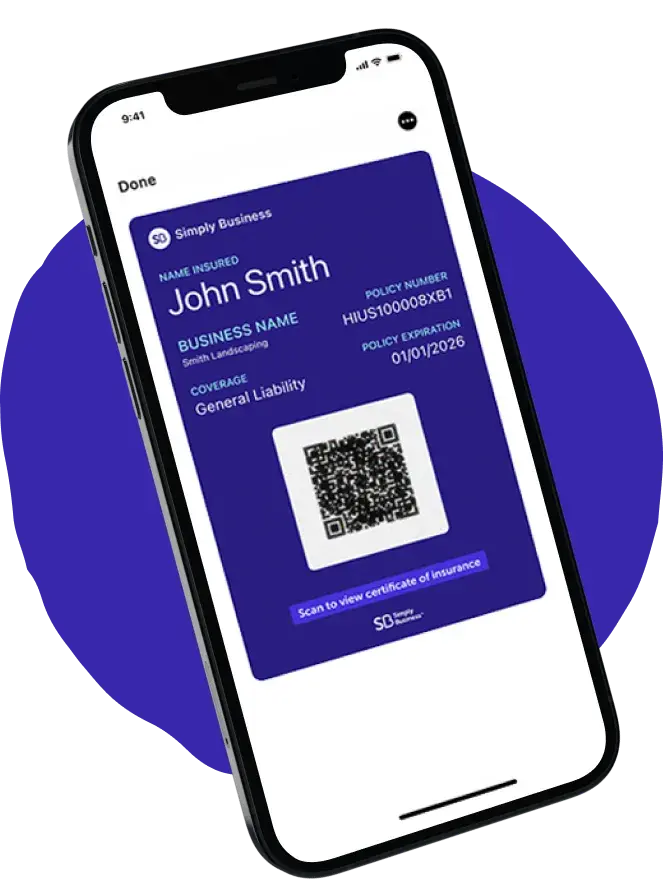Certificate of Insurance
Access, manage, and share your proof of insurance.
Already a customer?
Not the policy holder? Submit your request here.
Need coverage?
Instant access
Get most COIs in minutes online in your account.
Simple management
Add certificate holders, additional insureds, and more, 24/7.
Easy sharing
Download and send COIs, and store them on your mobile device.
Your one stop for the coverages small businesses need
General Liability
Coverage for third-party accidents, property damage, and bodily injury.
Workers’ Compensation
Coverage to help take care of employees who get sick or injured on the job. Many states require this for businesses with full or part-time employees.
Inland Marine
A solution to financially protect the tools and equipment you use while in transport or on a job site.
Professional Liability
Coverage for damages and legal costs for mistakes or negligence claims. This policy is often recommended for businesses that provide advice and guidance to their clients.
Access, manage, and share your COI
Log in to your account, click on the COI button, and you can:
- Instantly download your COI
- Add a certificate holder, additional insured, and endorsements or special wording.
- Share a copy via email
- Store a copy in your digital wallet

Answers to COI questions
What is a certificate of insurance?
It’s a document that proves you have an insurance policy for a particular type of coverage.
Who needs a certificate of insurance?
Customers, vendors, landlords, lenders, and others may require a COI to do business with you.
What’s included on a COI?
A COI summarizes important information about the policy, such as types and limits of your coverage, your insurance provider, policy number, named insured(s), and coverage start and end dates.
How do I get a certificate of insurance?
You can get a COI from your insurance provider. With Simply Business, you can access, manage, and share your COI 24/7 through your online account or our digital COI assistant.
How much does a certificate of insurance cost?
We provide a certificate of insurance at no extra cost, and you can use it immediately as proof to your clients and employees that you’re protected.
How does a certificate of insurance differ from an insurance policy?
You can think of your COI certificate as a summary of all the key facts related to your policy. It provides the key information a customer, vendor, or other business contact might need.
What is a Waiver of Subrogation (WOS) and what is Primary and Noncontributory (PNC), and why is my customer asking me about them?
Customers may ask about WOS (Waiver of Subrogation) or PNC (Primary and Noncontributory) endorsements in order to protect themselves from financial losses and legal disputes, and to ensure that you, the policyholder, is adequately insured for any accidents.
To add one or both of these endorsements to your COI, log in to your account.
Customers may ask about WOS (Waiver of Subrogation)or PNC (Primary and Noncontributory) endorsements in order to protect themselves from financial losses and legal disputes, and to ensure that the contractor is adequately insured for any accidents.
A WOS (Waiver of Subrogation) ensures that your insurer will not pursue your customer for paid claims, reducing the customer’s risk of litigation or financial liability. It also ensures that insurance claims are handled without involving your customer.
The term PNC (Primary and Noncontributory) stipulates the order in which multiple policies triggered by the same loss are to respond. A policy with a PNC endorsement ensures that it takes precedence over other policies and provides the initial insurance coverage in the event of a claim. Only after the policy limits have been fully utilized will other insurance policies involved in the claim begin to contribute.
What is an ACORD 25 certificate of insurance?
This is an industry standard form that proves you have an insurance policy. It summarizes important information about the policy, such as types and limits of your coverage, your insurance provider, policy number, named insured(s), and coverage start and end dates.
Who is the certificate holder on a certificate of insurance?
This is a person or entity who has a certificate of insurance (COI) in their possession. That could be the policyholder, or a person or entity who has asked the policyholder for a COI as proof of insurance. Being a certificate holder does not necessarily mean you are covered by the policy.
How do I read a certificate of insurance?
The key pieces of information on a COI include:
Company name: Make sure it matches the company you’re working with
Expiration date: This is when the coverage ends. Make sure it extends past the completion date of any work.
Type of coverage: This indicates what type of insurance policy is in effect (e.g. general liability, workers’ comp, etc.).
Coverage limits: This is the amount of coverage provided by the policy.
Make sure the company name on the form matches the vendor name that you are hiring.


